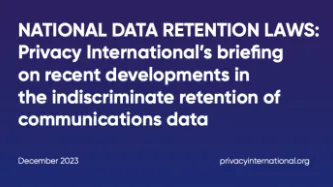Search
Content type: Report
First published in 2017, PI’s Guide to International Law and Surveillance is an attempt to collate relevant excerpts from these judgments and reports into a single principled guide that will be regularly updated. This is the fourth edition of the Guide. It has been updated it to reflect the most relevant legal developments until March 2024.The Guide aspires to be a handy reference tool for anyone engaging in campaigning, advocacy, and scholarly research, on these issues. The fourth…
Content type: Report
Over the past years, data retention regulation imposing generalised and indiscriminate data retention obligations to telecommunication companies and Internet service provides has been introduced in various jurisdictions across the world. As the data retention practices across the world have evolved this new report is an attempt to shed some light on the current state of affairs in data retention regulation across ten key jurisdictions. Privacy International has consulted with human…
Content type: Long Read
Miguel Morachimo, Executive Director of Hiperderecho. Hiperderecho is a non-profit Peruvian organisation dedicated to facilitating public understanding and promoting respect for rights and freedoms in digital environments.The original version of this article was published in Spanish on Hiperderecho's website.Where does our feeling of insecurity come from? As we walk around our cities, we are being observed by security cameras most of the time. Our daily movement, call logs, and internet…
Content type: News & Analysis
Photo: The European Union
On 2 September 2019, Privacy International, together with 60 other organisations, signed an open letter to the European Parliament to express our deep concern about upcoming EU policy proposals which undermine the EU’s founding values of human rights, peace and disarmament.
Since 2017, the EU has diverted funds towards security research and security capacity-building in countries around the world. The proposal for the EU's next budget (2021-2027) will…
Content type: Advocacy
RESPONSE OF PRIVACY INTERNATIONAL TO THE CONSULTATION ON THE GOVERNMENT’S PROPOSED RESPONSE TO THE RULING OF THE COURT OF JUSTICE OF THE EUROPEAN UNION ON 21 DECEMBER 2016 REGARDING THE RETENTION OF COMMUNICATIONS DATA
[Full response below]
Introduction
The consultation is in response to the judgment in Tele2 Sverige AB v Post-och telestyrelsen (Case-203/15) and R (Watson) v Secretary of State for the Home Department (Case C-698/15) [“Watson judgment”].
The case concerned…
Content type: Explainer
In 2000, the Government told Parliament that the Regulation of Investigatory Powers Act 2000 (RIPA) was the total extent of surveillance powers that were needed. However, within weeks of RIPA receiving Royal Assent, a report from UK law enforcement was leaked, stating that the power the Government truly wanted was companies to retain communications data on all their users.
Immediately after 9/11 as governments around the world over-reached with new pieces of…
Content type: Long Read
Six years after NSA contractor Edward Snowden leaked documents providing details about how states' mass surveillance programmes function, two states – the UK and South Africa – publicly admit using bulk interception capabilities.Both governments have been conducting bulk interception of internet traffic by tapping undersea fibre optic cables landing in the UK and South Africa respectively in secret for years.Both admissions came during and as a result of legal proceedings brought by Privacy…
Content type: Long Read
Imagine that every time you want to attend a march, religious event, political meeting, protest, or public rally, you must share deeply personal information with police and intelligence agencies, even when they have no reason to suspect you of wrongdoing.
First, you need to go to the police to register; have your photo taken for a biometric database; share the contacts of your family, friends, and colleagues; disclose your finances, health records, lifestyle choices, relationship status, and…







